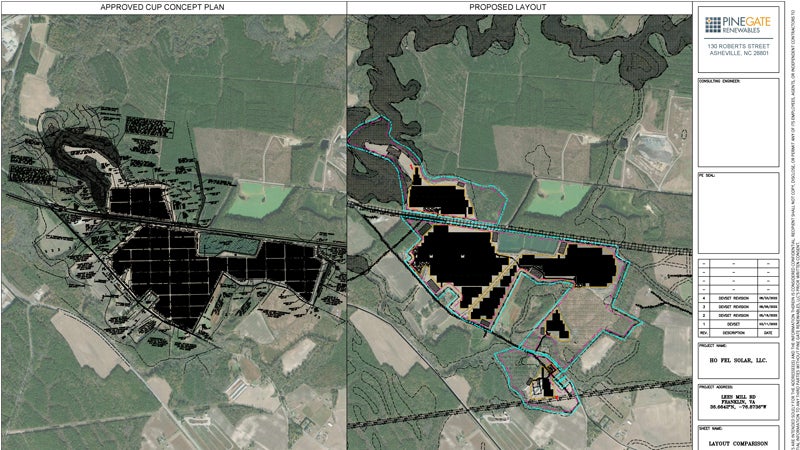Supervisors delay vote on expanding solar farm in southern Isle of Wight
Published 4:26 pm Monday, November 21, 2022

- On left is the 2019 concept plan. On right is the 2022 concept plan showing the proposed expansion of the Ho-Fel solar farm. (Images courtesy of Isle of Wight County)
Isle of Wight County supervisors have postponed voting on a developer’s request to add acreage to a planned solar farm.
SolarGen of Virginia LLC, a subsidiary of Colorado-based Aquasan, had received supervisors’ approval in 2019 to build a 55-megawatt, 300-acre project named the Ho-Fel solar farm on Lees Mill Road near International Paper’s Franklin mill. Asheville, North Carolina-based Pine Gate Renewables has since purchased the project – which has yet to break ground – and is proposing to expand the facility by 18 acres.
Matt Boerger, Pine Gate’s project permitting manager, told Isle of Wight County’s Planning Commission in October that the original proposal had called for fixed-position solar panels, whereas Pine Gate is now proposing to use the type that rotate to follow sunlight. The redesign, Boerger said, would lower the anticipated output from 55 megawatts to 40 and require the panels to be spaced further apart to facilitate their motion, necessitating the additional acreage.
Though the Planning Commission had given the project a favorable recommendation, county resident David Tucker of Old Stage Highway urged at the supervisors’ Nov. 17 public hearing that the board reject the expansion. He argued that the 2019-approved proposal had in fact specified rotating panels, thereby negating Pine Gate’s explanation for the lower electricity output and increased acreage.
According to county records, the project narrative submitted by Aquasan in 2019 listed “145,000 solar panels, on a single tracker system” that would “follow the movement of the sun from east to west each day.”
Tucker was the only one to speak during the hearing, though board Chairman Rudolph Jefferson read aloud a Nov. 15 letter from Dustin Atkins, a farmer who owns land slated for the solar farm, in support of the project.
Responding to Tucker’s allegation, Boerger maintained it was his understanding that fixed panels had been approved in 2019.
Tucker “may be right,” Boerger acknowledged, but contended the current proposal still “pencils better.”
“I can just tell you that our engineers looked at what was approved and said we can do better. … I’m not the engineer, but I can tell you that this is a better project for us,” Boerger said.
Under Isle of Wight’s default machinery and tools tax rate, the project would generate $2.8 million for the county over its 40-year lifespan. Pine Gate has proposed a siting agreement offering an additional $1,400 per megawatt per year payment, which would increase 10% every five years, bringing roughly $4.5 million in total revenue to the county over the project’s lifespan.
Supervisor Dick Grice, however, contended that by lowering the number of panels from the original 145,000 to roughly 92,000, the project would be assessed less in machinery and tools taxes.
The landowners, Grice argued, are able to lease their land at a higher profit than they’d receive leaving it as farmland while Pine Gate would pay a lower overall tax, despite using more rural county land.
“How does that present us with a win-win scenario?” Grice asked.
Supervisor Don Rosie, who represents District 5, where the project would be located, said that while he respects “the farmer and the homeowner in their right to their own land,” the county was “on a learning curve here ourselves in regards to solar expansion.”
“To us, it’s another form of development, and one of the things that I think we try to do as a board … is that we manage our growth,” Rosie said.
The vote to table the matter was unanimous. The supervisors did not set a specific date for Pine Gate to return with more information.





